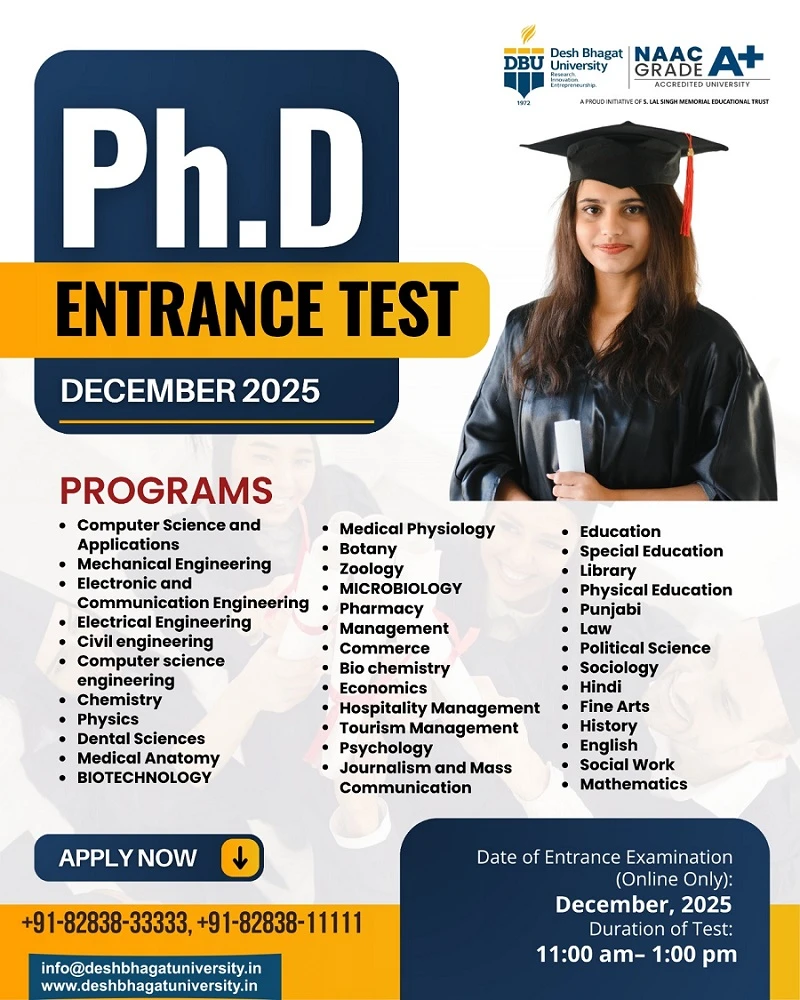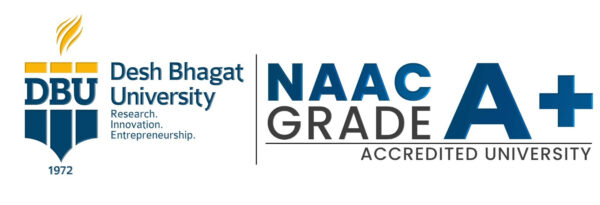How To Prepare For Phd Entrance Exam | Desh Bhagat University
October 29, 2025 2025-10-29 9:31How To Prepare For Phd Entrance Exam | Desh Bhagat University

How To Prepare For Phd Entrance Exam | Desh Bhagat University
Preparing for a PhD entrance exam can be a daunting task, but with the right strategies, you can set yourself up for success. In this comprehensive guide, we’ll jump into essential tips and techniques on how to prepare for a PhD entrance exam effectively.
From understanding the exam pattern to mastering subject-specific knowledge, the Desh Bhagat University guide will equip you with the tools you need to excel and secure your place in a prestigious PhD program.
Preparing for a PhD entrance exam is crucial for success in your academic journey. In this section, you will learn how to prepare for a PhD entrance exam with essential strategies to enhance your preparation. Discover how to understand the exam pattern, practice past papers, take mock tests, and adapt to institution-specific formats. These tips will help you build a structured study plan, improve your test-taking skills, and increase your chances of securing a place in your desired program.
What Is the Entrance Exam for PhD at Desh Bhagat University?
The entrance exam for PhD admission at Desh Bhagat University is simply the test you take to show that you are ready for research-level work. The university uses this exam to check your research skills, subject knowledge, and readiness for doctoral study. The admission process has two stages: Stage I is the entrance test, and Stage II is the interview.
Here are the key features:
- The entrance test is conducted by the university itself.
- After the test, candidates who qualify are called for an interview or presentation to discuss their research interests.
- The test paper is divided into sections, e.g., research methodology, functional English, computer knowledge, and subject-specific parts.
- The duration of the test is typically around 2 hours (for example, from 11:00 am to 1:00 pm) in recent sessions.
So, the exam is not just about your previous marks—it’s about showing you can think, research, and handle doctoral study.
How to Prepare for PhD Entrance Exam: Step-by-Step Guide
Preparing for a PhD entrance exam is crucial for success in your academic journey. In this section, you will learn how to prepare for a PhD entrance exam with essential strategies to enhance your preparation. Discover how to understand the exam pattern, practice past papers, take mock tests, and adapt to institution-specific formats. These tips will help you build a structured study plan, improve your test-taking skills, and increase your chances of securing a place in your desired program.

- Familiarize Yourself with the Exam Pattern
- Understand the Structure: Begin by reviewing the overall structure of the PhD entrance exam. This includes the types of questions (multiple choice, descriptive, etc.), the subjects covered, and the distribution of marks.
- Identify Key Areas: Note the weightage of different sections to prioritize your study efforts accordingly. For example, if a significant portion of the exam is focused on research methodology, allocate more time to this area.
- Practice Past Papers
- Solve Previous Years’ Papers: Obtain and solve past years’ exam papers to get an idea of the question formats and topics commonly covered. This practice helps you understand the level of difficulty and the types of questions that may appear.
- Analyze Your Performance: After solving past papers, review your answers critically. Identify areas where you need improvement and adjust your study plan to address these weaknesses.
- Take Mock Tests
- Simulate Exam Conditions: Regularly take mock tests under timed conditions to simulate the actual exam environment. This helps improve your time management skills and reduces exam anxiety.
- Review and Improve: Analyze your performance in mock tests to identify patterns in mistakes or areas needing more focus. Use this feedback to refine your study strategies and improve your test-taking skills.
- Understand Institution-Specific Formats
- Check Institutional Guidelines: Like Deshbhagatuniversity Different institutions may have variations in their PhD entrance exam formats. It’s crucial to check the specific guidelines and requirements of the institution you are applying to.
- Adapt Your Preparation: Tailor your study plan to align with the specific format and content areas highlighted by the institution. This ensures that you are well-prepared for any unique aspects of the exam.
- Create a Structured Schedule: Develop a study schedule that covers all relevant topics and allows for regular review sessions. Break down your study material into manageable sections and set achievable goals.
Staying Updated with Current Affairs
Staying updated with current affairs is crucial for PhD entrance exam, especially if your field involves recent developments. Here’s how to stay informed:
1. Follow Relevant Sources:
- Academic Journals: Read journals related to your research area to stay up-to-date with the latest studies.
- News Outlets: Follow news sources that cover current events in your field.
2. Subscribe to Updates:
- Newsletters: Subscribe to newsletters from academic institutions or organizations in your field.
- Alerts: Set up alerts for specific topics or keywords relevant to your research.
3. Engage with the Academic Community:
- Seminars and Webinars: Attend events related to your field to gain insights and updates.
- Discussion Forums: Join online forums or groups where professionals discuss recent developments.
4. Review Recent Publications:
- Research Papers: Regularly check for new research papers and publications in your area of interest.
Staying updated helps you understand recent trends and developments, making your knowledge more relevant and improving your performance in the exam.
- Include Breaks and Revision: Ensure your study plan includes regular breaks and time for revision. Balanced preparation helps maintain focus and prevents burnout.
By thoroughly understanding the exam pattern, practicing with past papers, taking mock tests, and adapting to institutional specifics, you can enhance your preparation and boost your chances of success in the PhD entrance exam.
This detailed breakdown should help students prepare effectively for their PhD entrance exam.
PhD Entrance Exam Syllabus at Desh Bhagat University
Understanding the syllabus is a major part of your preparation. Below is a breakdown based on DBU’s documents.
General Structure
- The syllabus is divided into two key parts: the research methodology component and the subject-specific component. For example, the syllabus for Mathematics says 50% research methodology and 50% subject-specific.
- For all PhD programmes at DBU, the guidelines say the admission process uses the entrance test with four sections: A, B, C, D.
- The duration and timing of the exam are specified (online, 11:00 am-1:00 pm, in recent sessions).
Key Topics You Should Cover
Even if your subject is different, these are the common topics you should study and prepare for:
Research Methodology
- Fundamentals of research: qualitative, quantitative, mixed methods
- Research design: survey, case study, experimental design
- Sampling techniques: random, stratified, cluster, convenience
- Data collection: questionnaires, interviews, observation
- Data analysis: descriptive & inferential statistics (mean, median, mode, variance, standard deviation), tests like t-test, chi-square, ANOVA.
- Research tools and software: e.g., MS Excel, SPSS, or equivalent.
- Interpretation of results, ethical issues in research.
Functional English & Computer Knowledge
- Understanding English: reading comprehension, vocabulary, grammar
- Writing skills: announcements, short essays, clarity of thought
- Computer basics: MS Office, spreadsheets, presentation tools, and basic data handling.
Subject Specific Topics
- Based on the subject of your PhD (for example: PhD in English, PhD in Tourism, PhD in Mathematics, etc), you should study advanced topics and current research. For example:
- For a PhD in English: literary criticism, translation studies, and language acquisition.
- For a PhD in Mathematics: advanced mathematical theories, research in mathematics.
- Also, review your Master’s level content because doctoral research builds on that.
Why This Preparation Works
- By knowing exactly what the exam covers (pattern + syllabus) you remove surprises. That means less stress, better timing, and more confidence.
- Focusing on research methodology gives you an edge, because many candidates focus only on subject content.
- Practising previous papers and mock tests improves your speed and helps you spot typical pitfalls.
- Preparing for the interview/presentation ensures the second stage does not become a weakness. You become ready for the full admission process.
- Tailoring your study to DBU’s specific format means you are better placed than someone who uses a generic strategy.
Final Thoughts
If you want to join the PhD programme at Desh Bhagat University, the entrance exam is the most important first step. You should understand what the exam is about, learn how to prepare for it, and know the full syllabus. This will help you build a strong base for your research journey.
Start early, follow a clear plan, cover research methodology and subject content, practice mock tests, and get ready for the interview. With consistent effort and focused preparation, you can secure your place and begin a productive research journey.
Good luck with your study and your PhD admission journey!
FAQ
The PhD entrance exam at Desh Bhagat University is the first step to getting admission into the PhD programme. It tests your knowledge of research methods, your subject, English, and computer skills. The exam helps the university know if you are ready for research work at the doctoral level.
The PhD entrance exam syllabus at Desh Bhagat University includes two main parts — research methodology and subject-specific topics. You will also get questions from functional English and basic computer knowledge. Every subject has its own detailed syllabus, which can be downloaded from the website.
To prepare well, start by studying the full syllabus and understanding the exam pattern. Focus on research methodology, improve your subject knowledge, and practise previous question papers. You should also work on your English, computer skills and prepare a short research proposal for the interview round after the exam.
The entrance test has multiple-choice questions divided into different sections. Section A covers research methodology, Section B covers English, Section C covers computer knowledge, and Section D is for subject-specific topics. The total duration is usually two hours, and the test is conducted by the university itself.
The research methodology section is very important because it forms a major part of the exam. It checks your understanding of how to design and conduct research. You should learn about sampling, data collection, analysis, and interpretation. Strong knowledge here shows that you are ready for real research work.
After you pass the written exam, you will be called for an interview or presentation. In this round, you will discuss your research interest or proposal with a panel of experts. They will check your understanding of the topic, clarity of ideas, and your readiness for doctoral research.
The exam mainly includes multiple-choice questions. These come from research methodology, English grammar, computer knowledge, and your subject. For example, you might get questions about research types, data tools, grammar usage, or theoretical concepts from your discipline. Practising sample papers helps you understand the question style better.
You can find the full PhD entrance exam syllabus, guidelines, and admission details on our website. The website provides syllabus PDFs for different subjects, exam dates, and instructions for the entrance test and interview rounds.
To score well, study regularly and plan your preparation. Focus on research methodology, revise your subject notes, and take mock tests. Work on your time management and accuracy. Make short notes for quick revision. Also, keep yourself calm and confident during the exam — it makes a big difference.
Desh Bhagat University provides a well-organized PhD programme with clear guidelines, expert faculty, and a supportive research environment. The entrance exam and interview process are transparent and fair. The university offers flexible study options, strong academic support, and good infrastructure to help scholars complete their research successfully.







